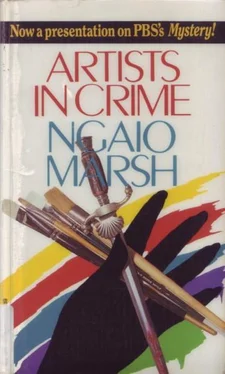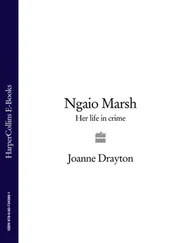Ngaio Marsh - Artists in Crime
Здесь есть возможность читать онлайн «Ngaio Marsh - Artists in Crime» — ознакомительный отрывок электронной книги совершенно бесплатно, а после прочтения отрывка купить полную версию. В некоторых случаях можно слушать аудио, скачать через торрент в формате fb2 и присутствует краткое содержание. Жанр: Классический детектив, на английском языке. Описание произведения, (предисловие) а так же отзывы посетителей доступны на портале библиотеки ЛибКат.
- Название:Artists in Crime
- Автор:
- Жанр:
- Год:неизвестен
- ISBN:нет данных
- Рейтинг книги:3 / 5. Голосов: 1
-
Избранное:Добавить в избранное
- Отзывы:
-
Ваша оценка:
- 60
- 1
- 2
- 3
- 4
- 5
Artists in Crime: краткое содержание, описание и аннотация
Предлагаем к чтению аннотацию, описание, краткое содержание или предисловие (зависит от того, что написал сам автор книги «Artists in Crime»). Если вы не нашли необходимую информацию о книге — напишите в комментариях, мы постараемся отыскать её.
Artists in Crime — читать онлайн ознакомительный отрывок
Ниже представлен текст книги, разбитый по страницам. Система сохранения места последней прочитанной страницы, позволяет с удобством читать онлайн бесплатно книгу «Artists in Crime», без необходимости каждый раз заново искать на чём Вы остановились. Поставьте закладку, и сможете в любой момент перейти на страницу, на которой закончили чтение.
Интервал:
Закладка:
“No.”
“Did she ever speak much of Garcia?”
“Not much. But she seemed as if — as if in a sort of way she was sure of Garcia. And yet he was tired of her. She’d lost her body-urge for him, if you ask me. But she seemed sure of him and yet furious with him. Of course, she wasn’t very well.”
“Wasn’t she?”
“No. I’m sure that was why she did that terrible thing to Troy’s portrait of Seacliff. She was ill. Only she asked me not to say anything about it, because she said it didn’t do a model any good for her to get a reputation of not being able to stand up to the work. I wouldn’t have known except that I found her one morning looking absolutely green , and I asked her if anything was the matter. She said the pose made her feel sick — it was the twist that did it, she said. She was honestly sick, and she felt sort of giddy.”
Alleyn looked at Miss Lee’s inquisitive, rather pretty, rather commonplace face and realised that her sophistication was more synthetic than even he had supposed. “Bless my soul,” he thought, “the creature’s a complete baby — an infant that has been taught half a dozen indecorous phrases by older children.”
“Well, Miss Lee,” he said, “I think that’s all we need worry about for the moment. I’ve got your aunt’s address— ”
“Yes, but you will remember, won’t you? I mean — ”
“I shall be the very soul of tact. I shall say we are looking for a missing heiress believed to be suffering from loss of memory, and last heard of near Bossicote, and she will think me very stupid, and I shall learn that you spent the entire week-end in her company.”
“Yes. And Watt — Hatchett, I mean.”
“He was there too, was he?”
Again Miss Lee looked self-conscious and maidenly.
“Well, I mean, not all the time. I mean he didn’t stay with us, but he came to lunch and tea — and dinner on Saturday and lunch on Sunday. Of course he is rough, and he does speak badly, but I told auntie he can’t help that because everybody’s like that in Australia. Some of the others were pretty stinking to him too, you know. They made him feel dreadfully out of it. I was sorry for him, and I thought they were such snobs. And anyway, I think his work is frightfully exciting.”
“Where did he stay?”
“At a private hotel near us, in the Fulham Road. We went to the flicks on Saturday night. Oh, I told you that, didn’t I?”
“Yes, thank you. When you go back to the dining-room, will you ask Mr. Hatchett to come and see me in ten minutes’ time?”
“Yes, I will.”
She got up and gazed at Alleyn. He saw a sort of corpse-side expression come into her face.
“Oh, Mr. Alleyn,” she said, “Isn’t it all awful ?”
“Quite frightful,” responded Alleyn cheerfully. “Good evening, Miss Lee.”
She walked away with an air of bereavement, and shut the door softly behind her.
“Oy!” said Nigel from the arm-chair.
“Hullo!”
“I’m moving over to the fire till the next one comes along. It’s cold in this corner.”
“All right.”
Fox, who had remained silently at the writing-desk throughout the interview with Miss Lee, joined Alleyn and Nigel at the fire.
“That was a quaint little piece of Staffordshire,” said Nigel.
“Little simpleton! All that pseudo-modern nonsense! See here, Bathgate, you’re one of the young intelligentsia, aren’t you?”
“What do you mean? I’m a pressman.”
“That doesn’t actually preclude you from the intelligentsia, does it?”
“Of course it doesn’t.”
“Very well then. Can you tell me how much of this owlishness is based on experience, and how much on handbooks and hearsay?”
“You mean their ideas on sex?”
“I do.”
“Have they been shocking you, Inspector?”
“I find their conversation bewildering, I must confess.”
“Come off it,” said Nigel.
“What do you think, Fox?” asked Alleyn.
“Well, sir, I must say I thought they spoke very free round the dining-room table. All this talk about mistresses and appetites and so forth. Very free. Not much difference between their ways and the sort of folk we used to deal with down in the black divisions if you’re to believe what you hear. Only the criminal classes are just promiscuous without being able to make it sound intellectual, if you know what I mean. Though I must say,” continued Fox thoughtfully, “I don’t fancy this crowd is as free-living as they’d like us to believe. This young lady, now. She seems like a nice little girl from a good home, making out she’s something fierce.”
“I know,” agreed Alleyn. “Little donkey.”
“And all the time she was talking about deceased and body-urges and so forth, she never seemed to realise what these sick, giddy turns might mean,” concluded Fox.
“Of course the girl was going to have a child,” said Nigel complacently.
“It doesn’t follow as the night the day,” murmured Alleyn. “She may have been liverish or run-down. Nevertheless, it’s odd that the little thought never entered Miss Lee’s head. You go back to your corner, Bathgate, here’s Mr. Watt Hatchett.”
Watt Hatchett came in with his hands thrust into his trousers’ pockets. Alleyn watched him curiously, thinking what a perfect type he was of the smart Sydney tough about to get on in the world. He was short, with the general appearance of a bad man in a South American movie. His hair resembled a patent-leather cap, his skin was swarthy, he walked with a sort of hard-boiled slouch, and his clothes fitted him rather too sleekly. A cigarette seemed to be perpetually gummed to his under-lip which projected. He had beautiful hands.
“Want me, Inspector?” he inquired. He never opened his lips more than was absolutely necessary, and he scarcely seemed to move his tongue, so that every vowel was strangled at birth, and for preference he spoke entirely through his nose. There was, however, something engaging about him; an aliveness, a raw virility.
“Sit down, Mr. Hatchett,” said Alleyn, “I shan’t keep you long.”
Hatchett slumped into an arm-chair. He moved with the slovenly grace of an underbred bounder, and this in its way was also attractive.
“Good-oh,” he said.
“I’m sure you realise yourself the importance of the information we have from you as regards the drape.”
“Too right. I reckon it shows that whoever did the dirty stuff with the knife did it after everyone except Garcia and Mr. Highbrow Malmsley had cleared off to London.”
“Exactly. You will therefore not think it extraordinary if I ask you to repeat the gist of this information.”
Hatchett wanted nothing better. He went over the whole story again. He went down to the studio on Friday afternoon — he remembered now that it was half-past two by the hall clock when he left the house — and noticed the drape lying crumpled on the throne, as Sonia had left it when she got up at noon. It was still undisturbed when he went away to catch the bus.
“And yesterdee evening it was stretched out tight. There you are.”
Alleyn said nothing about Troy’s discovery of this condition on Saturday afternoon. He asked Hatchett to account for his own movements during the week-end. Hatchett described his Friday evening’s entertainment with Phillida Lee and Ormerin.
“We had tea and then we went to a theatre they called the Vortex, and it was just about the lousiest show I’ve ever had to sit through. Gosh! it gave me a pain in the neck, dinkum it did. Three blokes in a sewer magging at each other for two bloody hours, and they called it a play. If that’s a play give me the talkies in Aussie. They’ll do me. We met the chap that runs the place. One of these die-away queens that likes to kid himself he amounts to something. You won’t get me inside a theatre again.”
Читать дальшеИнтервал:
Закладка:
Похожие книги на «Artists in Crime»
Представляем Вашему вниманию похожие книги на «Artists in Crime» списком для выбора. Мы отобрали схожую по названию и смыслу литературу в надежде предоставить читателям больше вариантов отыскать новые, интересные, ещё непрочитанные произведения.
Обсуждение, отзывы о книге «Artists in Crime» и просто собственные мнения читателей. Оставьте ваши комментарии, напишите, что Вы думаете о произведении, его смысле или главных героях. Укажите что конкретно понравилось, а что нет, и почему Вы так считаете.







